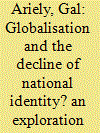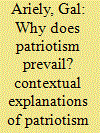|
|
|
Sort Order |
|
|
|
Items / Page
|
|
|
|
|
|
|
| Srl | Item |
| 1 |
ID:
114201


|
|
|
|
|
| Publication |
2012.
|
| Summary/Abstract |
This article challenges the common wisdom that national identification always leads to xenophobic attitudes toward immigrants. Analyzing cross-national survey data from dozens of countries reveals how the relations between national identification and xenophobic attitudes toward immigrants vary according to country citizenship policy. The more inclusive the citizenship regime, the weaker the relations are between national identification and xenophobia. In fact, in countries with full jus soli law there are, on average, negative relations between national identification and xenophobia while in other countries there are positive relations between the two. These findings are used to discuss the ways conceptions of nationhood are institutionalized in citizenship policy from a socio-psychological perspective.
|
|
|
|
|
|
|
|
|
|
|
|
|
|
|
|
| 2 |
ID:
181645


|
|
|
|
|
| Summary/Abstract |
This study explores the differences in system support between the ethnic majority and ethnic minority populations in Turkey and Israel, taking into account three specific dimensions of system support: national identity, evaluation of democracy, and institutional trust. A comparison of the gaps in these dimensions is conducted using surveys. The findings show that, in both countries, the majority tends to show higher levels of system support than the minority. Among the Turkish Kurdish minority, lower levels of system support can be found across all the dimensions examined, while among the Palestinian citizens of Israel minority, the gaps are bigger in the cultural aspect of national identity but much smaller in the evaluation of democracy and institutional trust. These findings are discussed in light of both the differences between the two regimes and their dissimilar strategies for addressing ethno-national divisions and the theoretical implications of examining the multidimensionality of system support.
|
|
|
|
|
|
|
|
|
|
|
|
|
|
|
|
| 3 |
ID:
114096


|
|
|
|
|
| Publication |
2012.
|
| Summary/Abstract |
The relationship between globalisation and national identity is puzzling. While some observers have found that globalisation reduces people's identification with their nation, others have reached the opposite conclusion. This article explores this conundrum by examining the relationship between globalisation and people's feelings towards national identity. Using data from the International Social Survey Program National Identity II () and the World Values Survey (), it analyses these relations across sixty-three countries. Employing a multilevel approach, it investigates how a country's level of globalisation is related to its public perceptions towards different dimensions of national identity. The results suggest that a country's level of globalisation is not related to national identification or nationalism but it is related negatively to patriotism, the willingness to fight for the country and ethnic conceptions of membership in the nation. An examination of alternative explanations indicates that globalisation has a distinct impact on national identity.
|
|
|
|
|
|
|
|
|
|
|
|
|
|
|
|
| 4 |
ID:
191821


|
|
|
|
|
| Summary/Abstract |
This article uses the case of the Covid-19 pandemic in Israel to examine whether there are differences in national identity between the vaccinated and the unvaccinated and how national identity is related to public views of the unvaccinated. A three-wave panel survey measuring national attachment, national chauvinism, and constructive patriotism from before and during the pandemic was used to trace differences in dimensions of national identity between the vaccinated and the unvaccinated and to explore their relationship to attitudes toward the unvaccinated. Findings indicated that national attachment was lower among the unvaccinated prior to the pandemic. However, regarding national chauvinism, there were no differences between the vaccinated and the unvaccinated over time; regarding constructive patriotism, there was a difference only in the third wave—at the end of the Covid-19 vaccination drive. The three dimensions of national identity were linked to negative attitudes toward the unvaccinated only at the end of the Covid-19 vaccination drive but not at the peak of the pandemic after the first lockdown. These findings are discussed in light of the current understanding of national identity during the pandemic.
|
|
|
|
|
|
|
|
|
|
|
|
|
|
|
|
| 5 |
ID:
153231


|
|
|
|
|
| Summary/Abstract |
Addressing the normative and empirical debate regarding the nature of patriotism, this paper examines the social contexts in which patriotism – defined here as an expression of national pride – thrives. Combining diverse theoretical explanations, it investigates whether expressions of patriotism are related to globalization, state function, social fractionalization and conflict. A multilevel regression analysis of data from 93 countries led to three principal findings. First, citizens of more developed and globalized countries are less likely to be proud of their country. Second, citizens are more likely to be patriotic in countries characterized by higher levels of income inequality and religiously homogeneity. Third, citizens of countries exposed to direct conflict – that is, suffering terror and causalities from external conflict – tend to exhibit higher levels of national pride. Patriotism frequently being identified as a mandatory political commodity, these results suggest that, overall, patriotism forms part of a less attractive matrix than its advocates tend to assume.
|
|
|
|
|
|
|
|
|
|
|
|
|
|
|
|
|
|
|
|
|